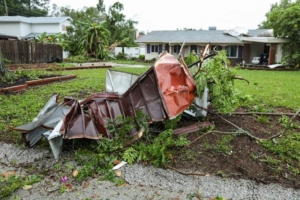15 Essential Items for Your Home Emergency Kit
 Emergencies can strike unexpectedly, leaving us vulnerable and unprepared. That’s why having a well-stocked emergency kit is essential for every household. From clean drinking water to communication devices, to cooking and boiling water, what do you need to ensure your family’s safety and comfort during unexpected emergencies?
Emergencies can strike unexpectedly, leaving us vulnerable and unprepared. That’s why having a well-stocked emergency kit is essential for every household. From clean drinking water to communication devices, to cooking and boiling water, what do you need to ensure your family’s safety and comfort during unexpected emergencies?
1. Water: The Lifesaver
When disaster strikes, access to clean drinking water becomes crucial. It’s recommended to have at least one gallon of water per person per day for at least three days. Consider purchasing bottled water or filling up water jugs in advance. Don’t forget to rotate your water supply periodically to ensure freshness.
2. Non-Perishable Food: Fuel for Survival
Stock up on non-perishable food items that can sustain you and your family for at least three days. Canned goods, granola bars, nuts, and dried fruit are excellent options. Remember to pack a manual can opener to open canned food. Consider dietary restrictions and preferences when selecting food items.
3. First Aid Kit: Be Prepared for Injuries
In any emergency, minor injuries are common. A well-stocked first aid kit is essential to provide immediate medical attention. Your kit should include band-aids, gauze, antiseptic wipes, pain relievers, and any necessary prescription medications. Keep the kit in a waterproof container and periodically check for expired items.
4. Flashlights and Extra Batteries: Shedding Light in the Darkness
Power outages are often a reality during emergencies. Having a flashlight for each family member, along with extra batteries, is crucial. Consider using headlamps for hands-free illumination, especially when working in low-light situations. Store flashlights and batteries in a readily accessible location.
5. Radio & Extra Batteries: Staying Informed
During emergencies, staying informed is essential. A battery-operated or hand-cranked radio can keep you updated on the latest news and instructions, especially when power, cellular, or internet services are disrupted. Be sure to pack extra batteries or choose a radio with a solar charging option.
6. Blankets and Sleeping Bags: Stay Warm and Comfortable
In the event of evacuation or loss of heating, blankets and sleeping bags provide warmth and comfort. Pack enough for each family member. Consider thermal blankets or sleeping bags that are lightweight and compact for easy transportation.
7. Extra Clothing: Prepare for Changing Conditions
Including a change of clothes for each family member is crucial in emergency situations. Choose comfortable and weather-appropriate clothing that can withstand varying conditions. Don’t forget to pack sturdy shoes, socks, and undergarments.
8. Cash: Access to Funds
During emergencies, you may not have access to electronic payment methods or ATMs. It’s wise to have some cash on hand in small denominations for essential purchases or unforeseen expenses. Consider including coins as well.
9. Portable Propane for Cooking & Hygiene
Propane is a reliable and efficient fuel source that can power various appliances during emergencies. Consider having your propane-powered grill as part of your emergency preparedness plan. Even a propane turkey fryer can be used to heat hot water for you and your family.
10. Multi-Purpose Tool: A Versatile Companion
A multi-purpose tool, such as a Swiss Army Knife, can prove invaluable during emergencies. It can serve various purposes, such as opening cans, cutting ropes, or repairing essential equipment. Choose a tool with multiple functions and a compact design.
11. Duct Tape: The Ultimate Fixer
Duct tape is a versatile item that can be used to address multiple emergency situations. It can temporarily seal leaks, mend broken items, or create improvised solutions. Pack a roll of duct tape in your emergency kit for its countless applications.
12. Maps: Navigating Unknown Territory
In the event of evacuation or relocation, having maps of your local area and potential safe zones is essential. Familiarize yourself with evacuation routes and keep updated maps in your emergency kit. Consider laminating them for durability.
13. Whistle: A Sound for Help
A whistle can be a lifesaver in situations where you’re trapped, lost, or separated from your family. It’s a simple yet effective tool to signal for help. Make sure each family member has a whistle in their emergency kit.
14. Phone and Charger: Staying Connected
In today’s digital age, staying connected is crucial. Pack a portable phone charger to ensure your mobile devices remain powered during power outages. Invest in a set of two-way radios as a reliable communication alternative. Be sure to include spare batteries for both options.
15. Important Documents and Contact Information: Preserving Vital Information
In emergencies, having copies of important documents is crucial. Include passports, insurance policies, birth certificates, and any other essential paperwork in your emergency kit. Additionally, maintain a list of emergency contact information for quick reference.
Home Emergencies in Syracuse & Central New York
Building a comprehensive home emergency kit is an essential step in preparing for unforeseen circumstances. By including these 15 essential items, you can increase your family’s chances of staying safe and comfortable during emergencies. Remember to periodically check and update your kit to ensure that all items are in good condition and that nothing has expired. Stay proactive, stay prepared, and prioritize the safety of your loved ones.

 As all of our customers know, propane is a safe and a really great energy source for staying warm and cozy all winter long, especially in the Syracuse and Central New York area where we live. But like any energy source, things can happen that are beyond your control, and you need to know what
As all of our customers know, propane is a safe and a really great energy source for staying warm and cozy all winter long, especially in the Syracuse and Central New York area where we live. But like any energy source, things can happen that are beyond your control, and you need to know what 